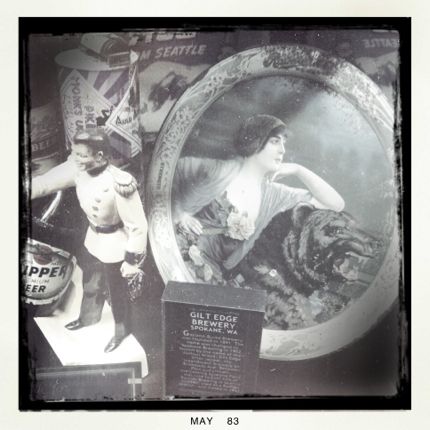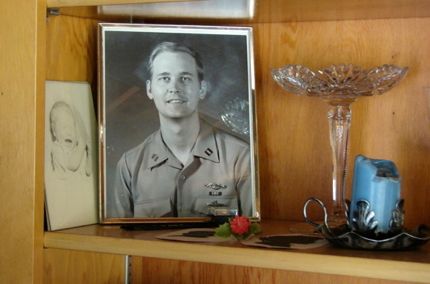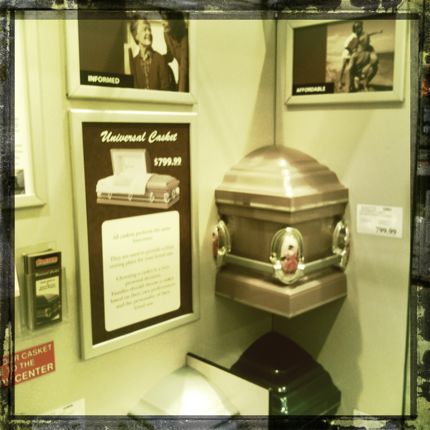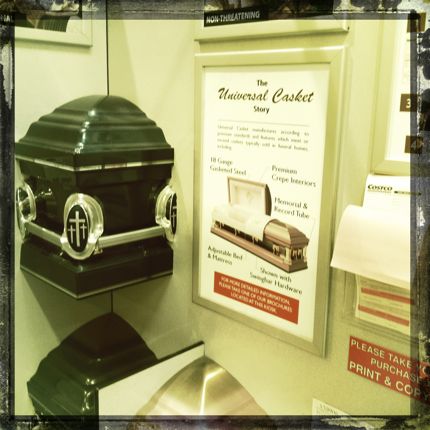
Inspiring Moment: Pile O’ Kittens
Written by Braiden
Comments and Praise
Fitting Funeral Tributes
Written by Chelsea Hanson on March 15, 2012
Our frequent guest columnist, Chelsea Hanson, has come up with a brilliant post on her blog entitled, How to Honor Your Loved One with a Funeral Tribute.
It struck a chord with me, because in addition to writing a story for Five More Minutes With, these are five more ways to pay homage to a departed loved one.
Thanks for sharing, Chelsea. You are doing such amazing work with your With Sympathy Gifts website, blog, and the World Grief Support Association.
What words could possibly express your feelings for your lost loved one? At a time like this, the task of coming up with words to adequately describe your feelings for someone we love can seem impossible. Nothing sounds right. No word is meaningful enough. Sometimes a picture, a memory, or even someone else’s words can do a better job of expressing our feelings than our own words. Here are some ideas of ways to honor your loved one with a touching tribute.
Video
When we lose someone close to us, we want to remember the life we shared together. A video gives us a chance to hear her laugh one more time, or to watch him play with his children. Put together a video montage of all of your favorite memories of your loved one to be played during the visitation or funeral. Let people remember your loved one they way they would want to be remembered.
Picture Board
A picture is worth a thousand words. Imagine the story you can tell with an entire board of photographs of your loved one. Choose pictures that remind people of the wonderful times in her life. Help people focus on the life she lived rather than her dying days.
Memory Table
A memory table is a table you set up with items that represent your loved one’s passions or hobbies. Bring in items that you know were important to your loved one, and invite others to bring their own items to place on the table. Maybe it’s an award she won or a letter she wrote to you.
Read a Poem
When you cannot find the words to say, there’s nothing wrong with borrowing someone else’s words if they accurately reflect your feelings. Find a meaningful poem or passage to read during the service. It doesn’t have to be particularly long, just as long as it’s from the heart.
Play a Song
Never under estimate the healing power of music. You could choose a song that had a special meaning to you and your loved one, or one that was written specifically to help people through hard times and death. During the service, say a few words about why the song is significant, and let people reflect on their loss as they listen to the beautiful music.
There are so many different ways to pay tribute to the ones that we’ve loved and lost. Everyone is unique, so choose a tribute that speaks to the kind of person you’re honoring and what you think they would love the most.
Comments and Praise
Inspiring Moment: Mussel Remains
Written by Braiden
Comments and Praise
Inspiring Moment: Exotic Big and Baby Heads
Written by Braiden
Comments and Praise
Welcome Brad Rex, Our New Guest Columnist
Written by Brad Rex on March 12, 2012
Today we welcome our newest guest columnist, Brad Rex. If the name sounds familiar, it should, because Brad is my beloved brother!
My younger brother and only sibling has led a exciting and eclectic life. He was a nuclear submarine officer, leader of Disney’s Epcot® theme park for five years, Executive Vice President/Chief Customer Officer for Hilton Grand Vacations, and a distinguished graduate of the United States Naval Academy and Harvard Business School. Today he’s a consultant, noted public speaker, husband for 30 years, and father of three.
I’m proud to report that Brad’s new book, “The Surpassing! Life,” will be published in May. And I’m honored to be among the first to excerpt parts of “Surpassing!” today and in the coming months.
Here’s his chapter entitled, “The 100 Item Club.” It includes tips on reducing the clutter in your life, so that you can enjoy each and every day to the fullest with your loved ones, very much part of the zeitgeist of Five More Minutes With. At the end, he even includes Action Points and the Payoff if you follow his recommendations.
Thanks for your wisdom, as always, Brad!
“We spend money we don’t have, to buy things we don’t need, to impress people we don’t like.”–Will Rogers
I recently read an article about the “100-Item Club.” Members of this club agree to only own a total of 100 items. In this case, an “item” means things like a spoon, cup, plate, toothbrush, belt, shirt, etc. It is not clear if a pair of shoes or socks is one item or two, but in the strictest definition, I assume you would have to count each sock or shoe separately. At first, I thought the concept of limiting yourself to this degree was crazy. But, as I considered it further, there is a simplicity and discipline that is appealing.
We all need to learn how to keep our lifestyles in check. Our marketing and sales driven culture is based on creating unnecessary dissatisfaction and desire. Before watching a television ad, you may have no idea that you “need” a pick-up truck or that you will be able to go out with a beautiful woman if you just drink a particular kind of beer. Advertisements play to particular fears, like having body odor or bad breath, or running out of money in old age. Many are focused on sexuality and being appealing to others. All promise to solve your problems (sometimes real, most often created) if you just buy a particular item or service. People get sucked into the spending cycle—buying something to make them feel better about themselves, getting initial pleasure and then a let down, and then buying something else that ultimately disappoints.
There are several ways to break the cycle. First, you have to differentiate wants from needs. You may want something, but do you really need it? More stuff leads to more hassles. One of the worst purchases I ever made was a waterskiing boat. When I left Disney, I promised to buy my children, who were then teenagers, a boat. After nine years in the Navy, I had had enough of boats to last me for my lifetime. But, I felt a little guilty that they would no longer be able to have Disney experiences (although Hilton stays were a great replacement!). The boat added major complexity to our lives, with trailering, maintenance, storage, insurance, fueling, cleaning, etc. It seemed like every time we planned a lake day, the boat didn’t work. It was an expensive burden.
As I thought about it, most new items that we buy are like the boat. We get the latest electronic gadget, then have to spend time figuring out how to make it work. If it is a computer, we have to do constant software upgrades or download new anti-virus software. Smartphones can be useful, but can also be a time sink and take away from personal interactions. The pleasure vs. stress trade-off is often out of whack, and your “wants” become encumbrances.
Second, if you do need it, think about buying it used. Marketers will tell you one of the most enticing words to put into an advertisement is “New.” People assume new is better and more desirable. Yet, there is often nothing wrong with “used.” I own a BMW and talked to one of their technicians while waiting on my car. I asked him about the most reliable cars, and he said the best strategy is to buy a car that is a few years old. He said, “It’s crazy that owners trade in their cars when they are three years old. That is just when all the bugs have been fixed. BMW is constantly upgrading the software in their vehicles, and the early years are when you have the most upgrades.” He recommended buying a pre-owned car that was a few years old, both for the value and the lowest maintenance requirements.
Third, don’t automatically buy a bigger house when your income increases. You should actually also consider renting rather than buying. We have lived in the same home for over 17 years. We have been very tempted to trade up to a larger home or one on a lake. But, we have also been very thankful as we have watched friends become “house poor” or even lose their homes when the economy and home prices turned down. By living in the same home for a long period, we have withstood real estate market changes and kept our taxes low. With that said, we should have considered renting rather than purchasing our home. Most studies show you should never buy a home unless you are certain to live in it for more than seven years, or you will lose money when compared to renting. As I look back, there is no question that we should have rented our homes instead of buying in the first decade of our marriage. Nancy and I moved 11 times in our first 13 years. We purchased two homes during that time. When we moved to England, we had to rent out our home in Cleveland. Had we not purchased, we likely would have lived in larger homes, simplified our lives significantly, and been better off financially.
If you want to dampen your inclination toward a materialistic lifestyle, work in a homeless shelter or, better yet, travel to a third world country and see how most of the world’s population lives. Most Americans have two homes, and don’t even realize it. An American family adopted a boy who lived in a slum in South America. When they got to their home, the boy put his few belongings in the garage, and started to set up his bed there. His adoptive parents asked him what he was doing, and he said he was putting his things in their “home.” They explained to him that this was the garage, and then opened the door to his home. “So, all Americans have two homes?” he asked, with an amazed look on his face. We don’t often think about having two homes, but to most people in other countries, the idea of storing your cars in an enclosed, covered space is extravagant.
Keeping your lifestyle in check provides simplicity, freedom from debt, an ability to give more to help others, and a fabulous example for your children—all part of a surpassing lifestyle.
Action Points
Before making any purchase, ask:
• Do I really need this, or am I being manipulated to buy it?
• Will this make my life simpler or more complex?
• Should I buy it used?
• Should I rent rather than buy?
Don’t buy a bigger house just because you can afford it.
Payoff
Financial freedom and a simpler, easier life.
Comments and Praise
Inspiring Moment: Mussels Remains
Written by Braiden
Comments and Praise
Costco Offers Products from Cradle to Grave
Written by Braiden Rex-Johnson on March 8, 2012
I just had to laugh on Saturday, when Spencer and I made a Costco run for our bimonthly supply of toilet paper, Kleenex, and protein drinks.
For near the eye-glass department, I spotted a big display for caskets made by the Universal Casket Company.
Of course, something so at once commercial, yet esoteric, and found in a big-box store such as Costco no less, immediately piqued my interest.
So I whipped out my iPhone4, fired up my Hipstamatic app, and began firing away.
Here are some of my favorite shots.
Purchase Your Universal Casket for just $799!
Exquisite detailing on the end of a Universal Casket
The Universal Casket story!
The story of the Universal Casket Company is intriguing. According to website information, the fourth-generation company found itself ailing due to funeral-home consolidation and increased competition. So it took the next logical step. . .offering up caskets online through their own website or through Costco Wholesale.
Nice to know that Costco can take you from the cradle to the grave with the purchase of a Universal Casket. You even buy a pink-rose casket spray for $349 to decorate your loved one’s final resting place.
Photos by Braiden Rex-Johnson
Comments and Praise
Inspiring Moment: Forsythia
Written by Spencer Johnson
Comments and Praise
Inspiring Moment: Bathroom Tiles
Written by Braiden
Comments and Praise
What is Crazy Love?
Written by John Paul Carter on March 5, 2012
“Crazy Love” was the original title of this column written by our frequent guest columnist John Paul Carter. It was first published in his twice-a-month column, “Notes From the Journey,” in the Weatherford Democrat, and we appreciate him allowing us to run in again for our FMMW audience.
Thanks a million, as always, John Paul!
Reporting on the news from Lake Wobegon, Garrison Keillor describes in agonizing detail the ordeal of Johnny Tollefson as his proud but eccentric family drives him to St. Cloud to help him register for his first semester of college. When they are unable to find a parking place, the mortified boy seizes his opportunity to escape, bolts from the car, and races alone toward the registrar’s office.
Keillor observes that, although the Tollefson boy doesn’t know it, it’s love that he’s experiencing. “What else,” he asks, “could make us behave so badly, if not love? What else could cause us to be so easily embarrassed, so self-conscious, so humiliated than just love?”
As anyone who’s ever loved can tell you, love can be crazy and painful. Most of us, like Johnny, at times have felt like we were being “loved to death.” And more than once, we’ve been baffled when our love and concern has been taken as something less.
Garrison Keillor’s tale reminds us that just because we do something out of love doesn’t mean that it will be perceived as love. The family meant well but in their exuberance they forgot the feelings of the one they loved. To the boy, their loving efforts felt like anything but love. On the contrary, he saw it as a potential threat to his new life that was just beginning.
An essential part of loving is paying attention to how those we love want and need to be loved. Loving another doesn’t make us all-knowing and even the knowledge we have often changes. We have to keep on finding out what says “I love you” to our beloved, and then do it!
The story also illustrates that just because it doesn’t feel like love, doesn’t mean it’s not love. Ill-conceived as their efforts were, the Tollefson family’s heart was in the right place. Although the boy could only feel embarrassment and fear in the moment, love and support for him was what was intended.
We sometimes mistakenly assume that if someone loves us, they will know exactly what we feel and need – without us having to tell them. If they don’t, we may question their love for us. However, whether or not we are loved is better discerned when we reflect on the other’s intent and their quest to know our heart.
If we are to love and be loved, we would do well to pray with St. Francis: “Grant that we may not so much seek to be understood as to understand.” Even so, we can only know in part. Learning to love is a lifelong process – a wonder-full mystery to be lived into, not a problem to be solved once and for all.

























































